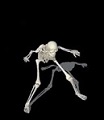You are not logged in.
- Topics: Active | Unanswered
Announcement
#121 2020-01-12 01:55:49
- Insane
- Player


- Reputation: +1130
- Location: Kharkiv
- Registered: 2016-07-07
- Posts: 1,201


Re: For the lovers of history
This should probably be in a separate topic but it`s a part of WWII history so I've decided to post it here.
~~~ THE UNUSUAL GRENADES OF WWII ~~~
US T13 "Beano" hand grenade.
Towards the end of WWII, this specialized hand grenade was developed for the OSS (Office of Strategic Services). Their requirements were for a baseball sized fragmentation grenade with an impact fuze.
Nicknamed the "Beano", it has a smooth steel body (.04" wall thickness) with a diameter of just under three inches (below 7,62 cm).
In use, it is held with the safety cap under the fingers, the pin is pulled and the grenade thrown. The grenade arms as it travels through the air.
It had a 20 meter effective radius.
The Beano had problems during development. Its performance was not consistent or particularly reliable. The fuze tended to freeze up in winter conditions as well as having a nasty habit of prematurely detonating. There were numerous casualties during development and test. (Impact fuzes historically have been a difficult feature to safely incorporate into a hand grenade.)
The problems were more or less worked out and the grenade was adopted for use as the T13 in January 1944. The term "Beano" was used prior to the formal type designation. While the T13 was shipped to Europe for field evaluation, it isn't clear if it was ever used in combat, although there is unverified information it was issued in limited numbers to troops for the Normandy Invasion.
German Blendkörper BK-2H Frangible Chemical "Smoke" Grenade
This is the second model Blendkörper ("Blinding Devices") BK-2H, introduced in 1943 as an anti tank weapon. It consists of a heavy glass bottle with a smaller glass vial nested inside. The dual bottle arrangement kept two chemical solutions separated.
The Blendkörper were thrown against tanks, smashing the glass containers allowing the chemicals to mix creating a spontaneous volatile reaction. Target areas were hatches, air vents or other openings leading to the main crew compartment. The caustic smoking mixture would penetrate to the interior of the tank incapacitating the crew, forcing them to abandon their vehicle.
Despite appearing to be a bizarre weapon, the Blendkörper were rather common in use. Over 5 million BK-2H were produced and practically all were used up by the end of the war.
UK Hand Grenade, No 82., Mk 1 and Mk 1/1 (The 'Gammon' Grenade).
Capt R.S. Gammon, MC, one of the original volunteers of 1 (British) Parachute Bn, was the inventor. He, together with numerous other British and Allied soldiers in the early years of World War II, had become extremely wary of what was then termed the 74(ST) Grenade
...or, more popularly, the 'Stickly' bomb.
This grenade had the unnerving characteristic of sometimes 'sticking' to the thrower; hence its nickname. The Sticky bomb was essentially an anti-vehicle and anti-AFV (Armoured Fighting Vehicle) weapon which had been produced in 1940, strongly encouraged by the British Prime Minister, Winston Churchill.
Numerous people, including Gammon, decided that a less dangerous and more effective grenade should be sought. Dick Gammon's design and original model were accepted. The basic design was to use a fuze, already available in the 69 Grenade
... which was then inserted into the mouth of an elasticized stockingette bag. This bag could then be filled with up to 0,9kg of moulded plastic explosives which was part of the paratrooper's normal equipment. The amount of plastic explosive varied according to the job for which it was designed. Priming of the detonation occurred when a steel ball dropped on the action of the bomb being thrown. Upon impact the bomb exploded. The fuze setting was originally a four second one through a weighted tape unravelling from the fuze after being thrown. Ordnance 'boffins' were appalled at the shortness of fuze, and the quantity of explosive that the bomb could contain, and accordingly ordered a seven seconds delay in order to ensure the thrower's safety. However, most users preferred the shorter tape, irrespective of the danger involved, and cut the tapes back to a four second delay.
The Gammon bomb became a great favourite with British Airborne forces, and the uses to which it was put were both varied and veritably hair-raising. Possibly the most famous occasion occurred on D-Day (6 June 1944), when 9 Bn of 6 Airborne Division had to attack and destroy the guns of Merville Battery, which was bombarding the seaborne assault of Normandy. A record states that 'the guns which turned out to be 75mm, and not 150 mm as anticipated were spiked and put out of action by Gammon Bombs'.
The grenade could, on occasion, be detonated by a rifle shot when safety was of paramount importance. The Gammon bomb's versatility - being capable of taking varying amounts of explosive, and in multiple forms - was a particular boon to airborne troops who, after the parachute drop, were limited to the amount of munitions a man could carry.
In the early 1950s, the grenade was acknowledged as obsolete and its stocks were eliminated.
Last edited by Insane (2020-01-12 02:20:11)
#122 2020-01-12 15:58:20
- Insane
- Player


- Reputation: +1130
- Location: Kharkiv
- Registered: 2016-07-07
- Posts: 1,201


Re: For the lovers of history
The "Natter" (or a Grass snake)
https://www.youtube.com/watch?v=XzMCZObXQw8&t=76s
Last edited by Insane (2020-01-12 15:59:27)
#123 2020-01-12 15:59:57
- Goldie
- Marshal Murat


- Reputation: +337
- Registered: 2019-08-09
- Posts: 930


Re: For the lovers of history
https://www.youtube.com/watch?v=fi1OyVB2laY
https://www.youtube.com/watch?v=w0Wmc8C0Eq0
Last edited by Goldie (2020-01-12 16:00:13)
#124 2020-01-12 16:16:32
- Insane
- Player


- Reputation: +1130
- Location: Kharkiv
- Registered: 2016-07-07
- Posts: 1,201


Re: For the lovers of history
Yet another opinion that put "Russia" which was only a part of eastern slavic lands and firstly officially named as Russian Zardom by Ivan The Terrible in the year of 1547, above other slavs.
That icourages russians to impute all slavic lands which were called Rus but not Russia (for example Kyiv Rus, Novgorod Republic, and some others).
So it makes them think that everything that was made or discovered by people of all nations who lived for example in USSR as an achievement of russians. Like wictory in WWII for exapmle. Not only russians fought in war against Axis but all the soviet people: Belarusians (not Belorussians let me notice), Kazakhs, Ukrainians, Turkmens and many other who I didn't mention.
Last edited by Insane (2020-01-12 16:31:17)
#125 2020-01-16 12:11:13
- Insane
- Player


- Reputation: +1130
- Location: Kharkiv
- Registered: 2016-07-07
- Posts: 1,201


Re: For the lovers of history
Last edited by Insane (2020-01-16 12:11:31)
#126 2020-01-16 19:02:19
- Dionysus
- Player


- Reputation: +555
- Registered: 2014-07-14
- Posts: 863


Re: For the lovers of history
https://www.youtube.com/watch?v=vxheJXaV6k0
''Now, I have only one regret, I wished an earlier involvement''
#127 2020-01-17 16:20:51
- Insane
- Player


- Reputation: +1130
- Location: Kharkiv
- Registered: 2016-07-07
- Posts: 1,201


Re: For the lovers of history
#128 2020-01-22 16:06:59
- Insane
- Player


- Reputation: +1130
- Location: Kharkiv
- Registered: 2016-07-07
- Posts: 1,201


Re: For the lovers of history
Occupied Kharkov in colour, 1942.
https://youtu.be/3_uhYFoUMEA
Last edited by Insane (2020-01-22 16:08:09)
#129 2020-02-13 20:13:39
- Insane
- Player


- Reputation: +1130
- Location: Kharkiv
- Registered: 2016-07-07
- Posts: 1,201


Re: For the lovers of history
#130 2020-02-28 01:34:12
- Insane
- Player


- Reputation: +1130
- Location: Kharkiv
- Registered: 2016-07-07
- Posts: 1,201


Re: For the lovers of history
https://youtu.be/XexZaApjQFc
https://youtu.be/da-i28Kir70
Last edited by Insane (2020-02-28 01:34:46)
#131 2020-08-20 15:30:16
- Insane
- Player


- Reputation: +1130
- Location: Kharkiv
- Registered: 2016-07-07
- Posts: 1,201


Re: For the lovers of history
#132 2020-08-20 19:51:21
- joint
- Member


- Reputation: +1398
- Location: Dnepropetrovsk, Ukraine
- Registered: 2012-05-24
- Posts: 5,987


Re: For the lovers of history
https://youtu.be/byGGiNGZ5YE
https://youtu.be/sErztprQjP0
Last edited by joint (2020-08-20 19:54:52)
#133 2020-08-29 18:49:49
- Maasika
- Member

- Reputation: +299
- Registered: 2012-10-27
- Posts: 351


Re: For the lovers of history
#134 2020-09-07 11:45:22
Re: For the lovers of history
#135 2021-02-22 01:57:38
- Zwarrior
- Ex-Gulag guard


- Reputation: +1008
- Location: Lusitania
- Registered: 2018-10-14
- Posts: 1,381


Re: For the lovers of history
#136 2021-02-22 12:41:11
- llzkk
- Player
- Reputation: +46
- Registered: 2020-07-19
- Posts: 76


Re: For the lovers of history
Quite interesting maps to watch
https://mapire.eu/en/











